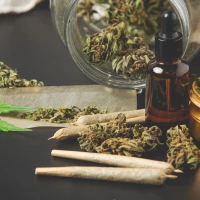
Weed Addiction Treatment in Merseyside
Get in touchCannabis addiction treatment in Merseyside CH62 7 is vital for those struggling with cannabis dependence.
Marijuana addiction can lead to significant mental health problems and disrupt personal and family recovery.
With the rise of cannabis use, understanding the available treatment options, including talking therapies and harm reduction, is crucial for those struggling with cannabis addiction.
Our comprehensive recovery programmes focus on evidence-based therapies, including detoxification, cognitive behavioural therapy (CBT), support groups, and rehab therapy programmes designed to provide holistic healing and a path to sustainable sobriety.
By emphasising tailored approaches, we equip individuals with the necessary tools to combat withdrawal symptoms and achieve long-term recovery through residential rehabilitation.
Weed Addiction Rehab Cost
The average cost of weed addiction rehab is £10,000.
The price of cannabis addiction rehabilitation can vary significantly based on a number of factors, such as:
· The type of treatment facility
· Location
· Types of treatments required
· Inpatient or outpatient care
Inpatient programmes tend to be more expensive, as they offer a structured environment where individuals receive round-the-clock care.
Outpatient programmes in Merseyside generally allow for greater flexibility, often resulting in lower costs.
If you would like to find out how much your rehabilitation stay would cost, please make sure to contact Drug Addiction Rehab today using the enquiry form provided.
Signs and Symptoms of Weed Addiction
Recognising the signs and symptoms of cannabis addiction in Merseyside is crucial for individuals and their families.
Cannabis dependence can manifest in various ways, affecting physical health, behaviour, and mental well-being, highlighting the necessity of seeking professional help for drug addiction.
Physical Symptoms
Physical symptoms of cannabis addiction may include noticeable changes in health, such as reduced appetite, fatigue, and withdrawal symptoms that occur when not using cannabis.
These symptoms can significantly interfere with daily routines and overall well-being, making early intervention through cannabis rehab essential.
For individuals struggling with dependence, persistent fatigue can lead to decreased productivity at work or in personal projects.
A reduced appetite may result in unintentional weight loss, which can, in turn, impact energy levels and nutritional intake.
Withdrawal symptoms often manifest as irritability and anxiety.
These can create challenges in maintaining relationships and social connections.
Over time, the accumulation of these physical symptoms can lead to chronic health issues, highlighting the importance of addressing cannabis dependence early on to promote a healthier and more fulfilling lifestyle through comprehensive rehab therapy programmes in Merseyside.
Behavioural Symptoms
Behavioural symptoms of cannabis addiction can manifest through changes in lifestyle, social interactions, and daily routines, often resulting in neglect of responsibilities and interests.
These adjustments can lead to a profound impact on personal relationships and obligations.
Individuals may withdraw from social gatherings, once enjoyable activities falling by the wayside, as the pursuit of cannabis takes precedence.
Significant declines in work or school performance can become evident, as motivation wanes and focus diminishes.
Declining grades or work output
Increased absenteeism
Apathy towards previously valued pursuits
Over time, these behavioural changes can not only affect the individual’s professional and academic life but also strain relationships with family and friends, leaving them increasingly isolated.
Recognising these red flags is crucial for anyone concerned about their own habits or those of a loved one, and seeking help through a local drug service or Merseyside Marijuana Anonymous can be a pivotal step.
Psychological Symptoms
Psychological symptoms of cannabis addiction often include anxiety, depression, and mood swings, which can significantly impact one’s mental health and overall quality of life.
These challenges frequently create a vicious cycle, wherein cannabis use may temporarily alleviate these uncomfortable feelings, leading individuals to rely on the substance as a coping mechanism.
Ironically, while it may provide short-term relief, it often exacerbates existing mental health issues, resulting in heightened psychological symptoms.
For instance, increased use can lead to heightened levels of anxiety, particularly when individuals are unable to access cannabis.
This reliance can also lead to isolation as social interactions decrease, further deepening feelings of depression, underscoring the need for effective mental health treatment.
Mood swings can cause conflict in personal relationships, creating additional stress.
As such, understanding the implications of cannabis use on mental health is crucial for both individuals and healthcare professionals.
The Importance of Seeking Professional Help
Seeking professional help for cannabis addiction is essential, as it provides individuals with access to specialised treatment options, support groups, and evidence-based recovery programmes grounded in cognitive behavioural therapy (CBT).
These facilities create a supportive environment where individuals can explore the underlying causes of their addiction, gain insights through individual and group therapy sessions, and learn coping strategies to manage cravings and triggers.
Rehabilitation facilities in Merseyside offer a structured approach that incorporates medical supervision, which can significantly enhance the chances of successful recovery.
Participating in support groups can foster a sense of community, allowing individuals to connect with others who are facing similar challenges.
Therapeutic approaches, including 12-step programmes and opioid addiction treatments, not only address the addiction but also focus on improving overall mental health, promoting long-term wellness.
By taking advantage of these resources, individuals pave the way for a healthier, drug-free life, breaking free from the cycle of drug addiction.
Types of Treatment for Weed Addiction
There are various types of treatment for cannabis addiction, each tailored to meet the individual needs of those seeking recovery, including:
inpatient rehabilitation
outpatient rehabilitation
group therapy
individual therapy options
Inpatient Rehab Programmes in Merseyside
Inpatient rehab programmes provide intensive treatment in a residential setting.
This allows individuals to focus solely on their recovery journey without distractions from the outside world, which significantly enhances their chances of achieving lasting sobriety and personal growth through comprehensive rehab.
These structured environments are designed to offer numerous benefits that can greatly aid those seeking to overcome addiction.
One of the primary advantages is the comprehensive support system that inpatient rehab facilities provide, which includes:
24/7 access to medical and therapeutic staff, ensuring that individuals receive immediate assistance whenever needed.
Customised treatment plans that address the unique challenges faced by each participant, promoting a more personalised recovery experience.
A wide range of therapeutic activities, such as group therapy and holistic wellness programmes, that encourage emotional healing and skill-building.
A supportive community that fosters connection, allowing individuals to share their experiences and build lasting friendships with others on similar journeys.
The structure of inpatient rehab programmes in Merseyside not only paves the way for recovery but also equips individuals with essential tools and resources to maintain a healthier lifestyle long after leaving the facility.
Outpatient Rehab Programmes in Merseyside
Outpatient rehab programmes in Merseyside CH62 7 offer treatment flexibility, allowing individuals to participate in recovery activities while maintaining their daily responsibilities and connections to family and community.
These programmes typically incorporate a range of therapeutic modalities, including individual therapy, group sessions, and educational workshops, tailored to support various stages of recovery.
Participants can benefit greatly from the opportunity to engage with peers who share similar experiences, fostering a sense of camaraderie and understanding.
Outpatient rehab is also particularly effective for those recovering from cannabis addiction, as it allows them to maintain their regular routines while receiving necessary support.
Group Therapy and Support Groups
Merseyside Group therapy and support groups, such as Marijuana Anonymous, play a critical role in the recovery programme for individuals battling cannabis addiction by fostering a sense of community and shared experiences.
These groups are essential for those recovering from cannabis dependency, providing a structured environment for sharing and growth.
These settings provide a unique environment where participants can connect on a personal level, sharing their journeys and struggles in a safe space.
The power of hearing others' stories cannot be understated, as it often validates one's own experiences and emotions.
Participants may find comfort in knowing they are not alone, which can be profoundly healing.
Individual Therapy in Merseyside
Individual therapy, particularly cognitive behavioural therapy (CBT), is essential in addressing the underlying mental health issues associated with cannabis addiction and providing personalised treatment strategies.
This therapeutic approach allows individuals to explore their thoughts and behaviours, uncovering the root causes of their addiction.
By understanding these patterns, a tailored plan can be developed that resonates with their unique experiences.
Among the various techniques utilised in individual therapy, mindfulness practices and motivational interviewing stand out as particularly effective.
These methods foster greater self-awareness and enhance motivation, leading to sustainable change.
Mindfulness Practices: These techniques help clients develop present-moment awareness, reducing cravings and stress.
Motivational Interviewing: This client-centred approach boosts an individual’s intrinsic motivation to change, supporting them in their recovery journey.
Research shows that combining these techniques with CBT not only addresses behavioural patterns but also fortifies emotional resilience, significantly improving treatment outcomes.
The Role of Detox in Weed Addiction Treatment
Detoxification plays a crucial role in cannabis addiction treatment as it helps individuals manage withdrawal symptoms and cleanse the body of cannabis, facilitating a smoother transition into recovery.
The detox process not only alleviates physical discomfort but also serves as a pivotal step in emotional healing.
During this phase, individuals experience a range of withdrawal symptoms that can vary in intensity, making professional support essential.
Physical Symptoms: These may include irritability, insomnia, and cravings.
Emotional Symptoms: Anxiety and mood swings are common as the body adjusts.
By addressing these challenges, detoxification lays a solid foundation for further treatment.
It equips individuals with the resilience they need to engage actively in therapeutic programmes, enabling a deeper exploration of underlying issues.
The detox process restores a sense of balance, significantly enhancing one's readiness for ongoing recovery activities.
Find Out More
Our team would be happy to provide you with more information on the addiction treatment options for marijuana addiction.
Support groups in Merseyside like Marijuana Anonymous are particularly beneficial for those recovering from cannabis addiction.
It’s important for those in need to connect with local drug services, which often provide personalised assessments and tailored recovery plans.
For immediate help, please contact our cannabis rehab team in Merseyside today.
By taking that first step towards awareness, individuals may find themselves on a path to a healthier, addiction-free life.
Frequently Asked Questions
What is weed addiction treatment?
Weed addiction treatment is a programme designed to help individuals overcome their dependency on marijuana.
It involves various therapeutic techniques, support groups, and counselling sessions to address both physical and psychological aspects of addiction.
How Common is Weed Addiction?
Weed addiction, or cannabis dependence, affects a significant portion of the population, with varying prevalence rates reported across different demographics and regions.
Various studies highlight the following key demographic trends:
Age: Young adults aged 18-24 exhibit the highest rates of cannabis use and subsequent dependence.
Gender: Males are more likely than females to develop problematic patterns of use.
Geography: Higher prevalence rates are often observed in regions where cannabis is legalised for recreational use.
Chronic cannabis use is frequently linked to an array of mental health issues, including anxiety, depression, and psychosis.
Is weed addiction treatment effective?
Weed addiction treatment has been proven to be effective in helping individuals overcome their dependency on marijuana.
With a comprehensive treatment plan and commitment from the individual, successful recovery is possible.
How long does weed addiction treatment last?
On average, weed addiction treatment programmes can range from 30 days to 90 days.
The length of weed addiction treatment varies for each individual, as it depends on several factors such as the severity of addiction, personal progress, and readiness for discharge.
We cover Merseyside
Get in touch
Skip to
Gallery


